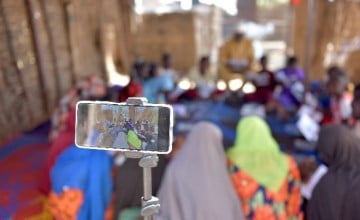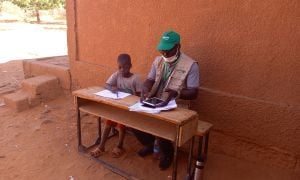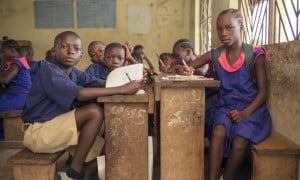
Read our 2024 annual report

Knowledge Hub

Learning Together-Apprendre Ensemble
Context
Niger has faced several challenges over the last decade. Historically, it’s often ranked last on the United Nations Development Programme’s Education Index and since the beginning of this decade, the situation has worsened. Five years of heightened insecurity in the Sahel have led to over 13 million Nigeriens living in poverty and increased displacement with over 335,000 internally displaced Nigeriens and 305,000 refugees from the region.
The country's population is growing at one of the highest rates in the world, averaging 3.8% per year, meaning that the population is more than doubling every 20 years (in 2018, 53% of Nigeriens were under 15 years old). There are therefore many implications for the education sector, with more than one million children entering the first grade of primary school each year by 2030.
Concern has been working in Niger since 2003 and its education programmes have consistently been focusing on access, quality and well-being. Concern has always worked with the Ministry of Education, regional directorates and inspectors to provide support to the formal education sector.
Programme Description
To promote schooling for children affected by security crises, Concern implemented the Learning Together programme from October 2020 to June 2025 (financed by the AFD - French Development Agency) that supported 250 formal schools and around 71,000 children in the Tillaberi and Tahoua regions. The programme focused on three outcomes:
- Outcome 1: Children in areas hosting displaced and refugee populations have access to quality primary education in safe and protective environments, enabling them to acquire basic skills (reading, writing, arithmetic) that promote social cohesion.
- Outcome 2: Girls and boys in areas where schools are closed for security reasons have equitable and continuous access to learning through school radio.
- Outcome 3: Local capacities for crisis preparedness, management and response are strengthened.
Through these three outcomes, Concern worked closely with local primary education officials and municipal and regional authorities, respecting the prerogatives of each. These actors were heavily involved and invested in this programme, particularly in community mobilisation activities and capacity building for community groups.
The programme targeted displaced children, refugees and those from the host community who have been affected by conflict, school closures and population movements. The objective was, on the one hand, to ensure the continuity of education as far as possible in areas of insecurity and, on the other hand, to ensure that the education systems in future host areas were equipped to effectively manage an increase in enrolment.
This programme provided for a flexible implementation environment and therefore planned a range of formal, accredited non-formal and non-formal educational offerings to ensure that children are supported to learn according to their needs and the context in which they live.

Conflict Sensitivity
Considering the context and the targeting of Education, ensuring conflict sensitivity in the approaches and implementation was essential and this has been done throughout the programme, based on a thorough conflict sensitive education analysis carried out at the beginning of implementation in 2021.
Conflict Sensitive Education Analysis
The objective of this analysis, while incorporating a 'do no harm' logic, was to produce evidence on the conflict situation and the education system in the project area before the start of activities. In general terms, this involved :
- Providing an overview of the risks, dynamics and actors of conflict and the links between education and conflict(s)
- Assessing the conflict sensitivity of Concern's planned intervention and identify opportunities to maximise the positive effects of contributing to peace and social cohesion and minimise any negative effects.
The analysis was carried out in September 2021 with a qualitative approach. Local interviewers conducted more than 180 focus groups and interviews with key actors in the field of education (inspectors and pedagogical advisors, teachers and headmasters, parents of children in and out of school as well as children in and out of school). These discussions provided data on perceptions of conflict, tensions between different groups, barriers to accessing education, or risks in villages and schools. The impacts of the crisis on education were also explored, as well as the possible risks posed by NGO interventions, including Concern's activities.
Data was collected, based on the needs that remained following a desk review, and analysed with the aim of understanding the context, the conflict dynamics and formulating operational recommendations for the implementation of the project, including identified risks and proposed mitigation measures.
(For more information on the analysis, to access the report or the tools used, please do not hesitate to contact: aissata.boukar@concern.net, agathe.freal@concern.net,amy.folan@concern.net or monica.kassouf@concern.net.)
Key Activities and Innovative Approaches

Distance Interactive Audio Learning
The situation has worsened in 2025: As of April this year, 1,097 schools were closed in the Tillabéry region alone. This has led to over 93,000 children out of school without any alternatives, posing the risk that an entire generation of children will be deprived of their right to education. To mitigate this risk, Concern, in partnership with the Ministry of Education, is implementing a strategy based on interactive audio lessons (distance learning) as part of its ‘Apprendre Ensemble’ (Learning Together) programme.
LIA (Interactive Audio Lessons) is an approach developed as part of the Education in Emergency programme. It aims to refresh and deepen children's knowledge using recorded audio lessons. This approach also allows children to learn and revise different subjects with the help of a community facilitator within a listening club. LIAs are not a substitute for formal or non-formal accelerated education systems, but rather a way of maintaining the level of pupils from closed schools while they await reintegration into the education system (and in areas where no other education alternatives can take place for security reasons).
In coordination with the national Non-Formal Education Working Group, Concern worked with the Ministry of Education and took the lead in setting up and coordinating a National Task Force for LIA made of Ministry Advisors, MoE Inspectors and pedagogical advisors, teachers and journalists with audio experience.

Pilot Phase
In 2022-2023, Concern started a pilot on the LIA approach. Based on existing scripts from Rising On Air, the taskforce adapted and contextualized 120 lessons in French and Maths (one lesson being 30 minutes in either French or Math). Those lessons also included songs and music, social emotional learning and PSS activities and health messages. The lessons were reviewed and recorded with a local radio studio with the voices of teachers and children to promote children’s engagement and interaction.
With collaboration with the Regional Education Offices, the Inspectors and Pedagogical Advisors, 16 communities were selected for the pilot to start listening clubs. A community facilitator is selected (by the community based on the one criteria of having some literacy level) and trained to facilitate listening clubs and support a group of children while they listen to the lessons on a radio device.
Based from the conflict sensitivity analysis, it was established that communities did not wish to have the lessons aired on the radio. Therefore, to ensure discretion, lessons were saved on usb keys for listening clubs to be able to listen to them on a radio device at a time and day that was convenient to them.
An evaluation workshop was then held with all the project’s stakeholders (members of the taskforce, Deputy Ministry General for Education, community facilitators etc) to assess the pilot phase and formulate decision and recommendations for the scale up.
The listening clubs have enabled pupils to reconnect with learning. (…) it keeps them in school mode and it is important to show them that they have not been forgotten. The pilot phase has been a remarkable success!
Scale Up
One of the main recommendations from the review workshop was to make an additional easier level with the addition of instructions in local languages.
In addition to the lessons from Level 1 and 2, Concern with the taskforce therefore developed a Level 0 with all instructions also recorded in two different local languages (to cater for displaced population speaking different dialects).
For the scale up, the LIA programme went from 120 lessons to 280 lessons adapted and recorded, therefore creating a 3-level 7-months long distance learning curriculum.
While the pilot had established 16 listening clubs, regional education authorities and inspectors asked for the scale up of the approach and the Learning Together programme established over 117 Listening Clubs, allowing over 3,000 children to access education in areas where schools were closed and where no other educational opportunities existed.
In addition to this, Concern also developed a student booklet to allow children to follow the lessons with a visual support. An assessment was also developed with the taskforce.
To allow better support for the community facilitators, Concern’s innovative Distance Video Coaching approach was extended to the Listening Clubs Facilitators to strengthen their capacity and ensure quality.
Results of LIA
- 91% attendance
- Children valuing this opportunity to socialise
- Increased learning outcomes :outcomes: between the pre-tests and post-tests (designed together with the MoE as placement tests) we observed improvement in children’s learning both in French and math with children
- In French, children scored on average 3.49 out of 10 at pre-test and 5.43 at post-test and in Maths, they went from 3.48 to 6.0 out of 10.
- Curriculum developed and ready to use (other partners trained on the approach as well as part of the RRM - Rapid Response Mechanism)
The children are happy to be reunited with their friends. One little girl said that this was the only time she got to see her friends.

Distance Video Coaching
The impact of school closures not only affected students but also the teachers and the quality of the education they are able to provide.
Following a successful 3-month pilot phase between March and June 2022, the Learning Together programme implemented an innovative distance video-coaching approach, providing continuous professional development support to 164 teachers and facilitators in inaccessible areas using new information and communication technologies (including tablets, tripods and smartphones).
Concern’s video coaching approach sits in alignment with Niger’s Ministry of Education’s (MoE) Sector Plan and is implemented with Inspectors and Pedagogical Advisors from the MoE. This approach has been developed to continue supporting teachers working in formal schools that are not accessible to the Pedagogical Advisors for security reasons. It was then extended to support facilitators from listening clubs (Concern’s distance interactive audio learning programme) in closed school zones.
This alternative form of remote continuous pedagogical development enables teachers in areas with high insecurity to continue to get much-needed routine support from their Pedagogical Advisor (PA), even and especially in difficult contexts and in turn improving the quality of teaching for children. For listening clubs’ facilitators, this also allows the MoE to be able to monitor the quality of learning received by children when schools are closed. The approach allowed 164 teachers and facilitators to adapt their practices, impacting over 7,110 pupils in highly volatile contexts.
With the help of digital tools, teachers in schools recorded themselves while teaching sessions. Head teachers then brought the videos to the PAs who in turn view the lessons and gave feedback to teachers by message. Specifically this involved:
Training all stakeholders on the ‘video coaching’ approach and how to process the film.
Inspectors, PAs, headteachers, teachers, facilitators and staff from partner NGOs. The trainings are done in bigger towns nearby based on security assessments.
Equipping them with IT tools.
Including tablets, smartphones, tripods, USB sticks, power banks.
Teachers film lessons.
2 lessons of 30 to 45-minutes every month (one in Maths and one in French).
PAs make feedback.
Teachers and head teachers review the feedback and implement necessary improvements while documenting this though a signed follow-up sheet.
Organise pedagogical days.
After each monthly remote monitoring report at school level to create a school community of practice and encourage peer-learning at school level.
As a practical alternative to the challenges of accessing schools in insecure areas, trained Inspectors and Pedagogical Advisors internalised the remote pedagogical approach and its associated tools and asked for the approach to be scaled up. This ensured the continuity of educational supervision for the benefit of teachers and students, even in difficult contexts.
Given the escalating emergency context in Niger, which can suddenly limit the ability of education actors to operate, the Ministry of Education recognises the value of strategies such as distance teacher support and distance audio learning. It offers reliable means to ensure access to and continuity of quality education for thousands of children affected by the crisis all over the country.
Accelerated Learning - Bridging Classes
The Stratégie de Scolarisation Accélérée Passerelle (SSAP) is Niger’s national accelerated learning strategy (bridging classes), designed for out-of-school or early drop-out children (roughly 8/9–12 years) to complete several years of primary curriculum in a condensed cycle and then (re)integrate into formal primary school.
Concern supports this strategy from the Education Sector Plan within its education in emergencies programme, particularly in crisis-affected regions like Tillabéri, Tahoua and Diffa. This includes setting up SSAP centres within formal schools (with the recruitment and training of facilitators). Over 3 years, Concern allowed 5,778 out-of-school children to complete an accelerated cycle and transition back to school, with only 8% of children unable to finish the cycle (including classes that had to close for security reasons). Out of those 5,778 children who completed the SSAP cycle, 66% had a score at the final exam that allowed them to reinter formal school in Grade 4 and 27% had a score to enter in Grade 3. Out of those children who transitioned back to school, 73% of children who had entered grade 4 passed into grade 5 and 53% of those who entered grade 3 moved to grade 4. On average, 66% moved to the next school grade a year later (awaiting 2025 data) compared to a regional progression rate of 55%.

Positive Discipline and Transformative Approach
Concern participated with the Ministry of Education and other partners in 2017 to an SRGBV Report. It was showing among others that:
- 68% of primary school children reported having experienced physical violence at school.
- For those children, four feelings were reported as a result: fear, hatred, humiliation, and injustice.
Based on those findings and the same issues raised again during our Conflict Sensitive Education Analysis at the beginning of the programme, Concern embedded teacher training around violence and corporal punishment within the programme approach. It seemed however that the issue was still raised by parents and children during the mid-term evaluation as an important barrier to Education.
Concern therefore redesigned the training to adopt a more participative and transformative approach. It is based on Concern’s gender transformative approach and adapted for this programme to investigate power relations between children and adults rather than between men and women. It is a 2 to 3-day training session with engaging activities and discussions allowing teachers to reflect on their own memories, practices, and ideas.
The manual was validated by the Ministry for Curriculum Development and rolled out by Pedagogical Advisors to teachers in 2024. Final evaluation (2025) highlighted teachers being receptive to the methodology and observations of change in behavior:
We also benefited from trainings, particularly positive discipline, which we had never seen before. We are seeing changes with the teachers. We are seeing positive reinforcement instead of corporal punishment
Challenges
Concern Worldwide’s Education in Emergencies programme in Niger has faced escalating threats to safe learning, with 1,097 schools closed in February 2025 due to insecurity, affecting more than 93,000 children, and 37 of the 200 Concern-supported schools in Tillabéri attacked and classrooms burned.
When someone points a gun at you and asks you to close the school you don't wait for anyone's permission to leave.
To continue operating safely, the programme had to adopt significant security adaptations, including relocating trainings to larger nearby towns, establishing rapid communication channels through WhatsApp and alert systems, avoiding activities that required extra time at school for students or staff, and suspending the use of NGO-branded vehicles.
Learning and Recommendations
From these challenges, several important lessons emerged. Strengthening social cohesion interventions was essential to reduce tensions between already-enrolled students and those entering from accelerated learning programmes, particularly in conflict-affected hosting areas where the children might be from different status (host communities, internally displaced or refugees). Additionally, the programme highlighted the need to design and implement robust remote monitoring and evaluation systems from the outset, co-developed with communities, Ministry counterparts, and local partners, to ensure continuity of oversight and accountability when insecurity restricts field access.
For more information on the analysis, to access the report or the tools used, please do not hesitate to contact: aissata.boukar@concern.net, agathe.freal@concern.net,amy.folan@concern.net or monica.kassouf@concern.net.




